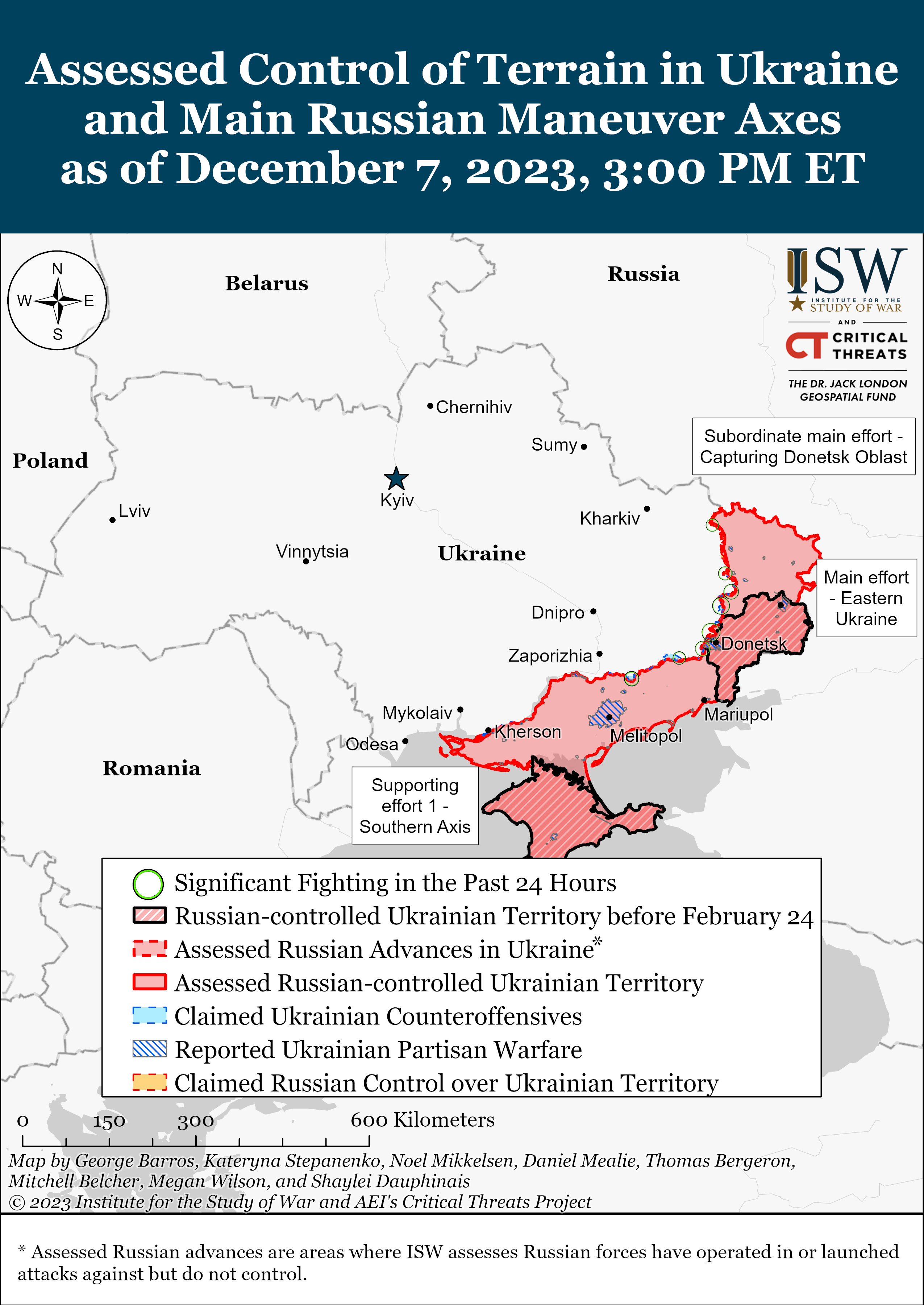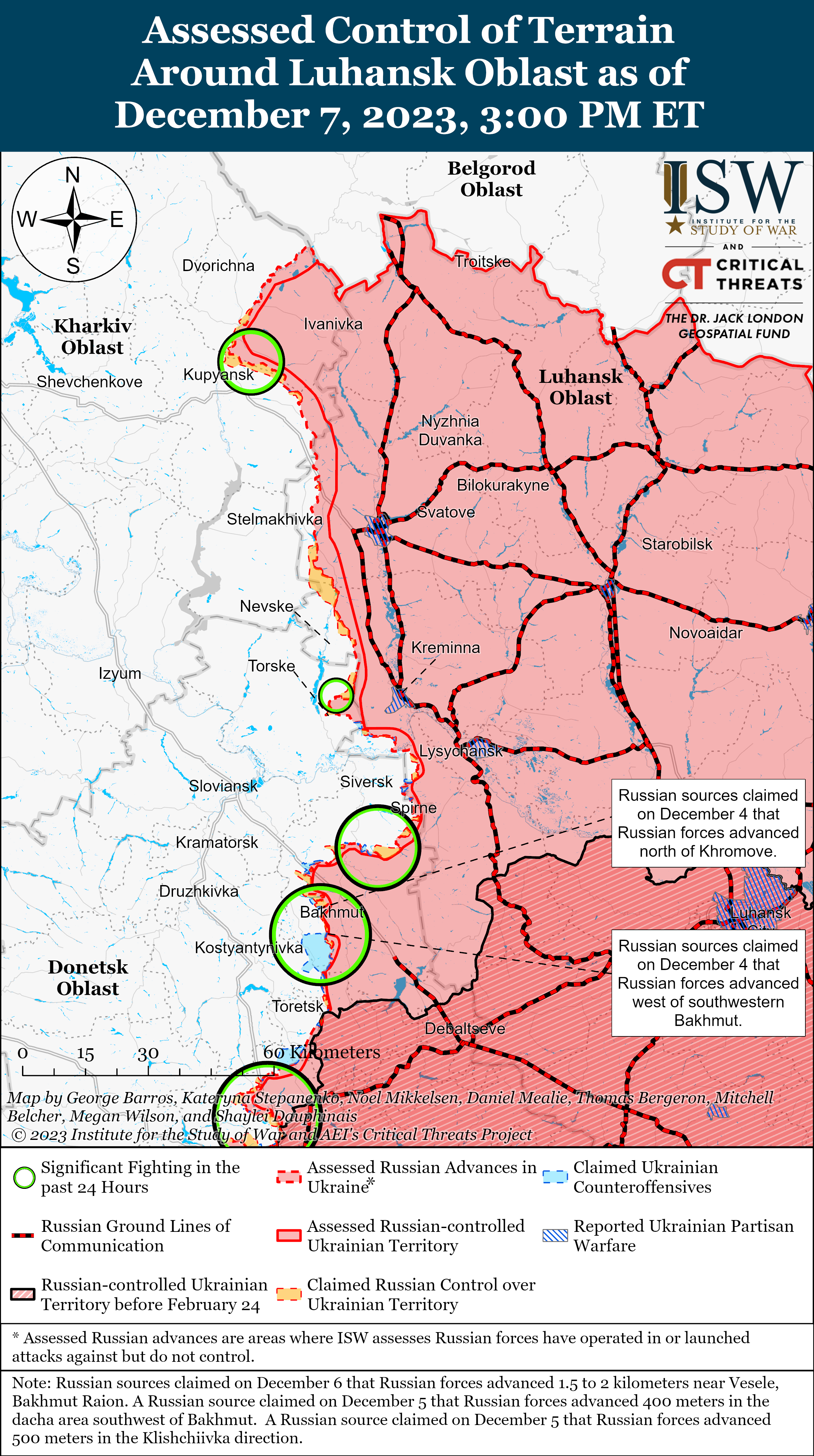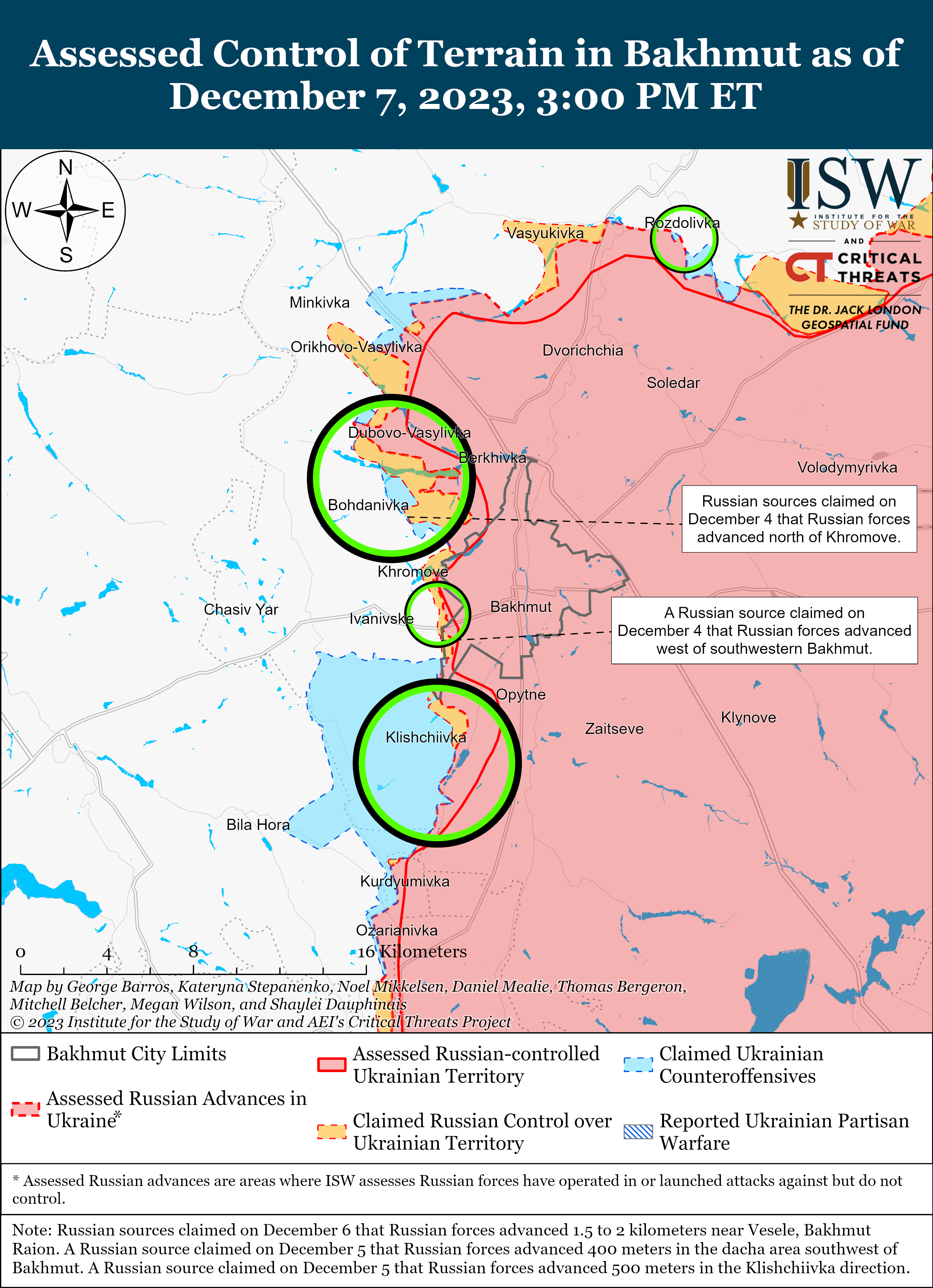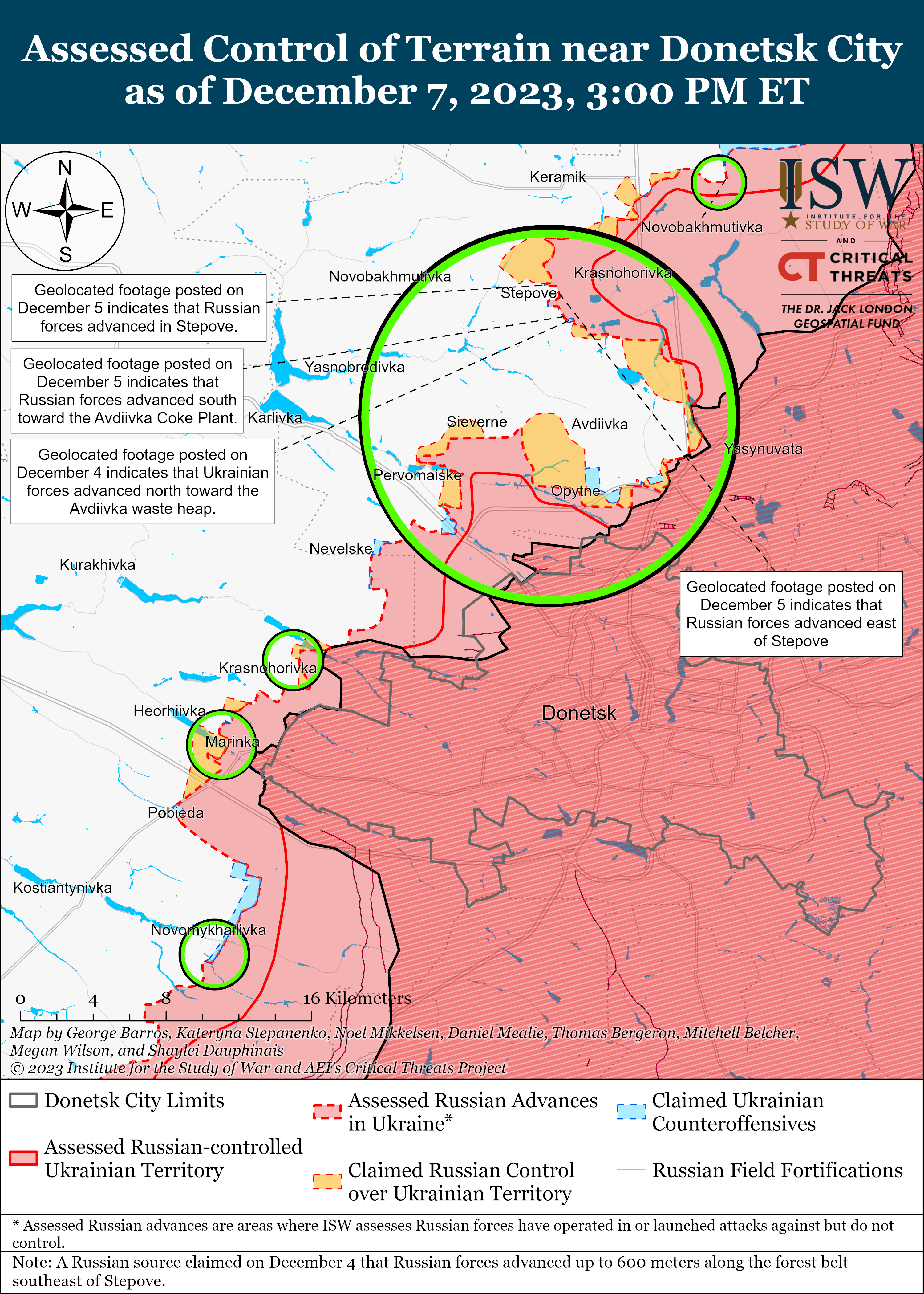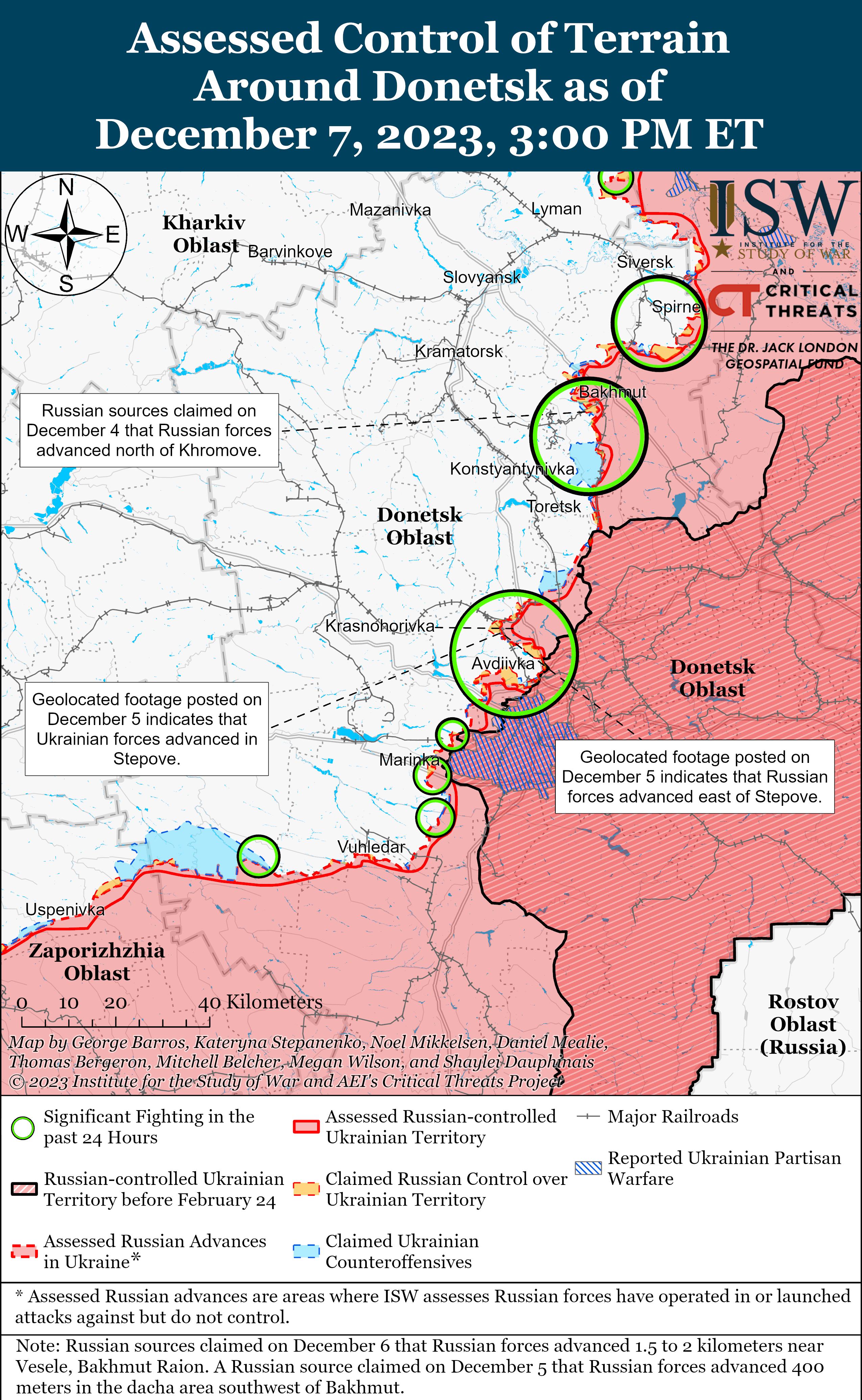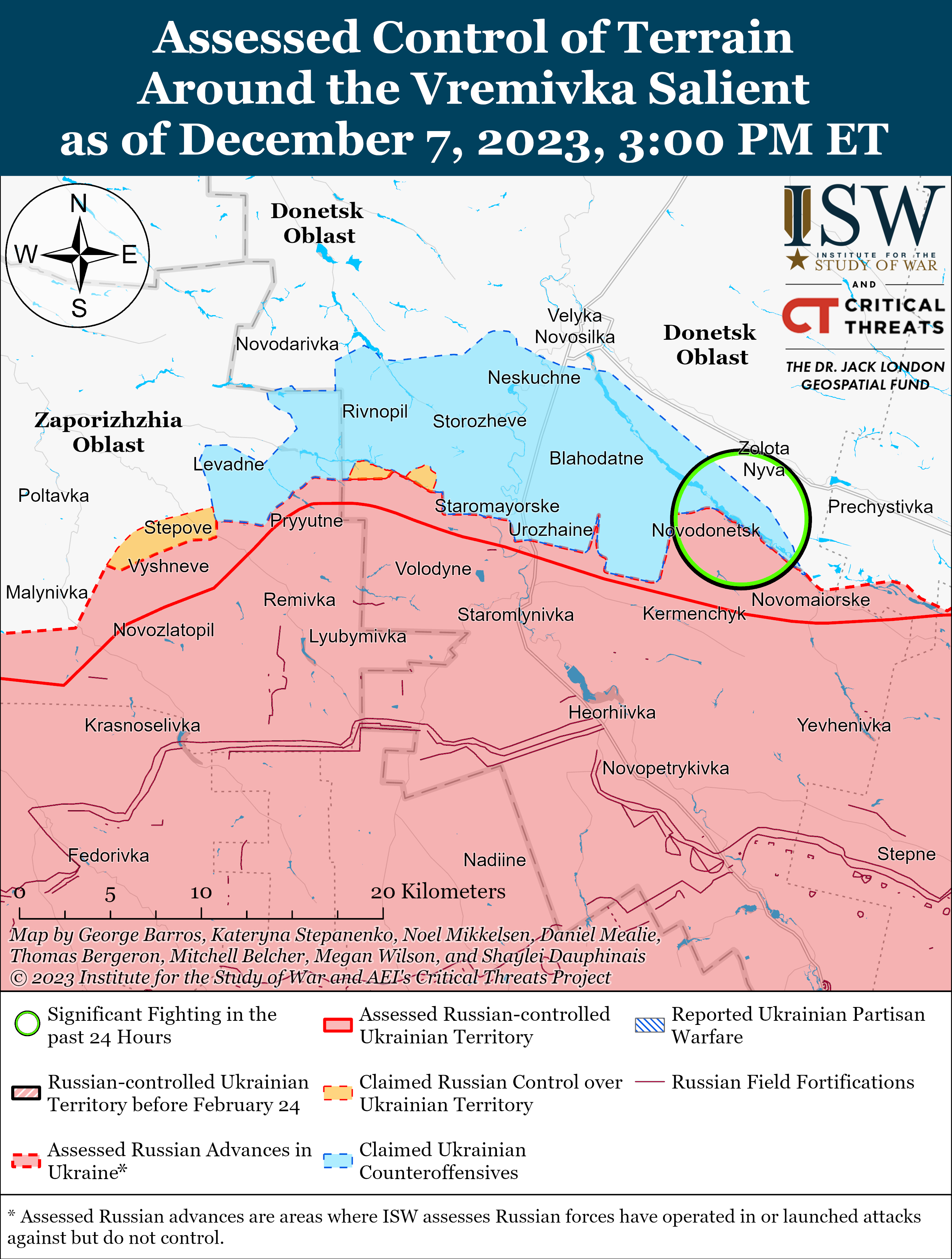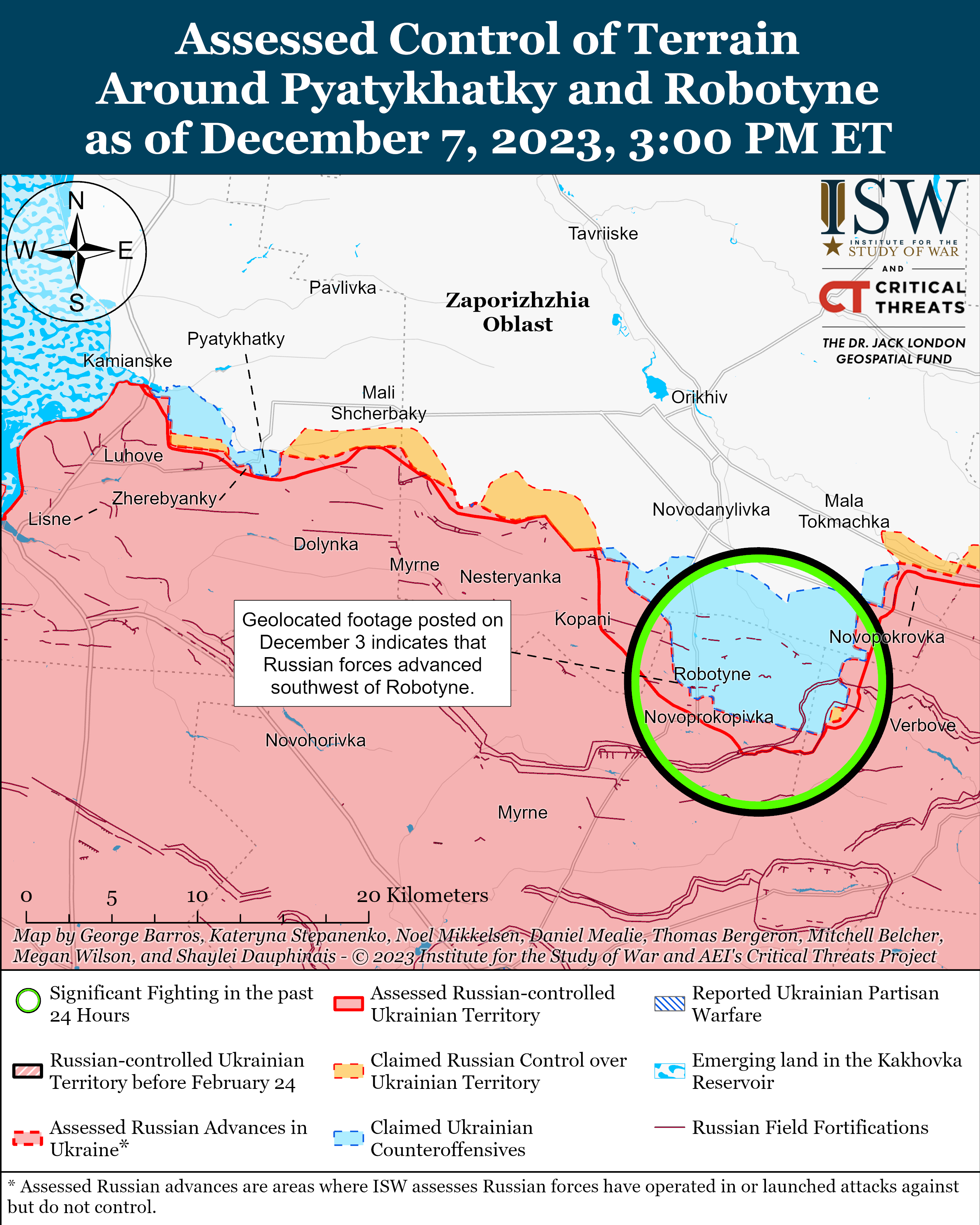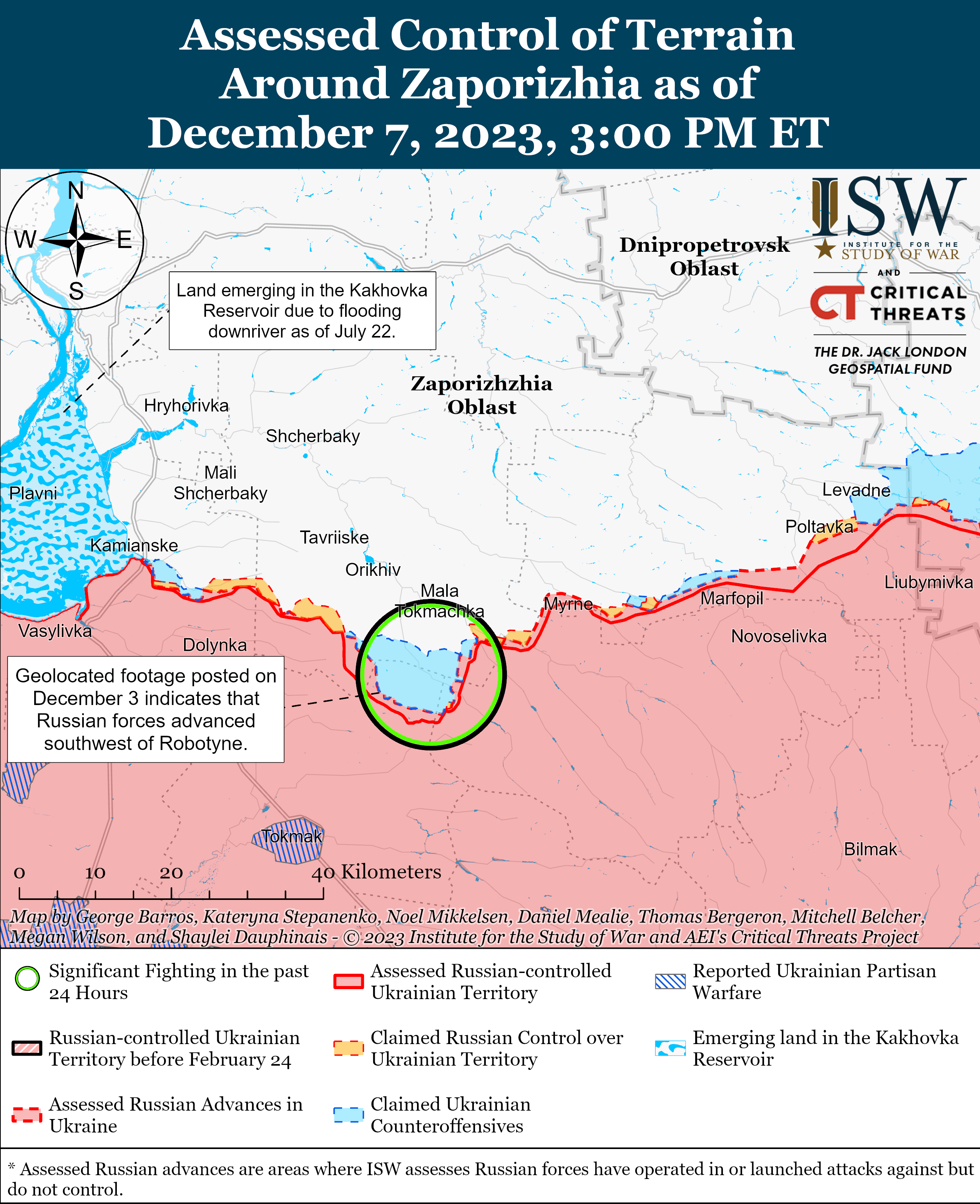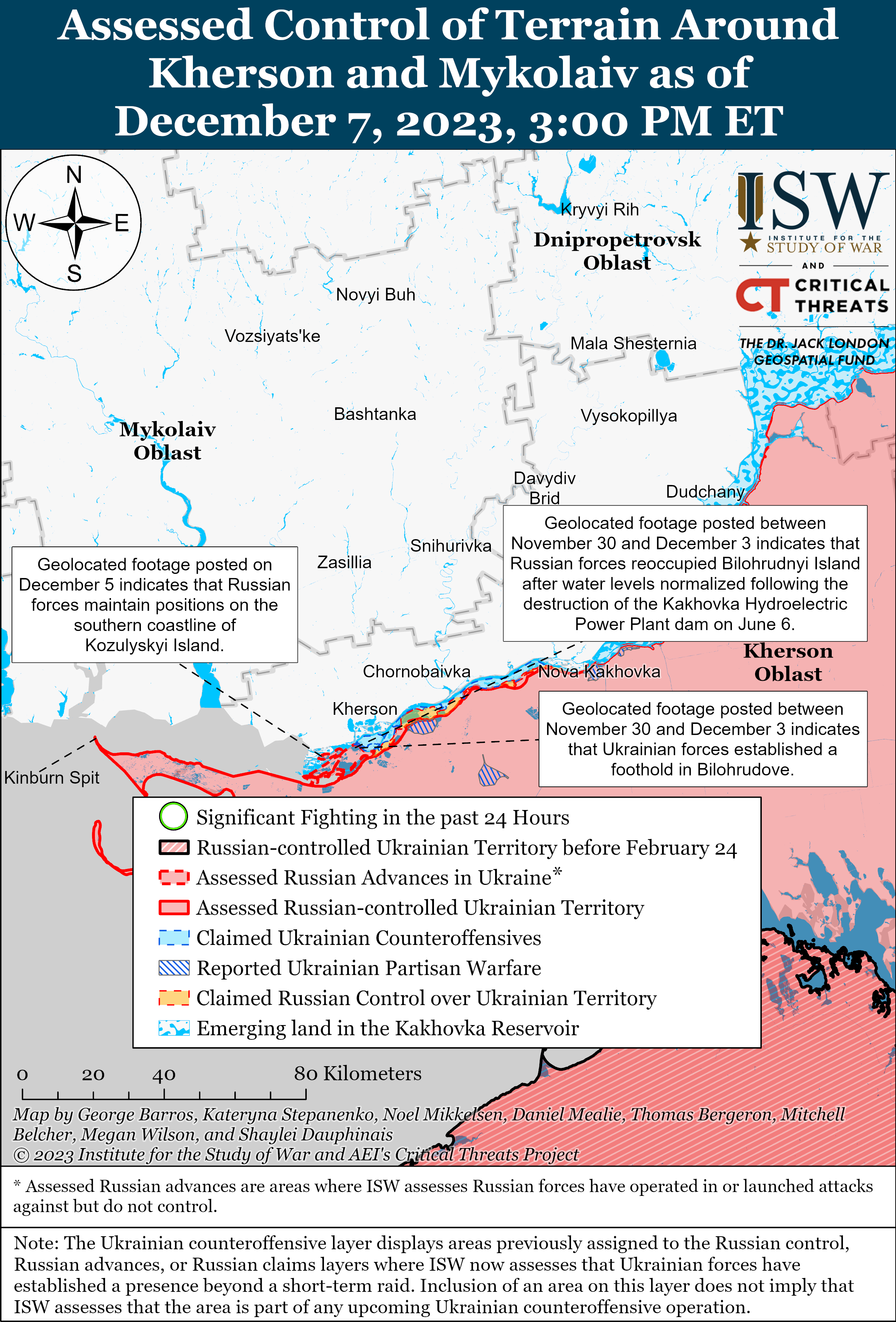Russian Offensive Campaign Assessment, December 7, 2023
Riley Bailey, Grace Mappes, Nicole Wolkov, Angelica Evans, George Barros, and Frederick W. Kagan
December 7, 2023, 6:45pm ET
Click here to see ISW’s interactive map of the Russian invasion of Ukraine. This map is updated daily alongside the static maps present in this report.
Click here to see ISW’s 3D control of terrain topographic map of Ukraine. Use of a computer (not a mobile device) is strongly recommended for using this data-heavy tool.
Click here to access ISW’s archive of interactive time-lapse maps of the Russian invasion of Ukraine. These maps complement the static control-of-terrain map that ISW produces daily by showing a dynamic frontline. ISW will update this time-lapse map archive monthly.
Note: The data cut-off for this product was 1pm ET on December 7. ISW will cover subsequent reports in the December 8 Russian Offensive Campaign Assessment.
Russian forces may be suffering losses along the entire front in Ukraine at a rate close to the rate at which Russia is currently generating new forces. Ukrainian Ground Forces Command Spokesperson Lieutenant Colonel Volodymyr Fityo stated on December 7 that Russian forces lost almost 11,000 personnel (presumably killed or rendered hors de combat by injury) in the Kupyansk, Lyman, and Bakhmut directions in November 2023.[1] The operational tempo in the Kupyansk, Lyman, and Bakhmut directions is currently lower than in the Avdiivka direction. These reported losses suggest that the Russian casualty rate in the Avdiivka area may be even higher given the higher operational tempo there. Ukrainian officials previously reported that Russian forces lost 5,000 personnel killed and wounded near Avdiivka and Marinka (west of Donetsk City) between October 10 and 26, when Russian forces launched two waves of heavily mechanized assaults to capture Avdiivka.[2] Russian forces are currently conducting mass infantry-led assaults to capture Avdiivka in an apparent effort to conserve armored vehicles despite the risk of even greater manpower losses.[3] Ukrainian officials have notably indicated that Russian defensive efforts are resulting in significant casualties as well, with Ukrainian forces reportedly killing over 1,200 Russian personnel and wounding over 2,200 on the east (left) bank of Kherson Oblast between October 17 and November 17.[4] Ukrainian forces continue counteroffensive operations in western Zaporizhia Oblast and are likely inflicting similar losses on defending Russian forces in this sector of the front. ISW cannot confirm Ukrainian-provided Russian casualty figures, and reliable figures for Russian casualties in Ukraine are not available. If the Ukrainian-provided figures are generally accurate they suggest that Russian operations in Ukraine are highly attritional overall and that high Russian losses are not just the result of the costliest Russian offensive operations near Avdiivka.
Russian and Ukrainian officials have reported that Russian crypto-mobilization efforts produce roughly 20,000 to 40,000 personnel a month, a rate that could be lower than Russia’s current casualty rate in Ukraine.[5] Ukrainian officials reported in spring and summer 2023 that Russia recruits roughly 20,000 personnel through crypto-mobilization efforts per month.[6] Ukrainian officials have reported that the Russian force grouping along the Kharkiv-Luhansk Oblast front has roughly not changed since summer 2023, suggesting that the commitment of new personnel to the area is offsetting Russian losses but not increasing the strength of that grouping.[7] Russian Security Council Deputy Chairperson Dmitry Medvedev previously claimed that the Russian military recruited 42,000 personnel between November 9 and December 1.[8] Ukrainian figures for Russian casualties along the front suggest that Russian monthly casualties could exceed the 20,000 monthly recruitment figure and may be even close to Medvedev’s much higher figure. Russian operations in Ukraine recently prompted the Russian military command to rush newly created and understrength formations to Ukraine to reinforce sectors of the front, impeding longer-term efforts to form operational and strategic reserves and restructure the Russian ground forces.[9] Both recruiting and casualty figures likely fluctuate over the course of the year, and all available figures are likely exaggerated. The reported numbers match observed battlefield conditions, however, as well as other Ukrainian reports that the Russian military has only been able to sustain its current manning level in Ukraine despite its reportedly high numbers of new recruits. High Russian casualties will likely prevent Russian forces from fully replenishing and reconstituting existing units in Ukraine and forming new operational and strategic reserves if Russian force generation efforts continue at current rates while the Russian military continues operations. Russia does appear able to continue absorbing such losses and making them good with new recruits, however, as long as President Vladimir Putin is willing and able to absorb the domestic consequences.
Russian forces conducted another series of drone strikes against Ukraine on the night of December 6 to 7. Ukrainian military sources reported on December 7 that Ukrainian forces downed 15 of 18 Russian-launched Shahed-131/136 drones that primarily targeted Khmelnytskyi and Odesa oblasts.[10] Ukrainian officials reported that Russian drones struck port infrastructure in Izmail Raion, Odesa Oblast, damaging a warehouse and a grain elevator.[11] Russian milbloggers claimed that Russian drones also struck the Starokostyantyniv airfield, Khmelnytskyi Oblast and other targets in Odesa Oblast.[12] Ukrainian Main Military Intelligence Directorate (GUR) Spokesperson Andriy Yusov stated that Russian forces do not have enough resources to strike Ukrainian energy infrastructure on a larger scale than last winter.[13]
The US Department of Defense (DoD) announced a new security assistance package and joint weapons production pledge to Ukraine against the backdrop of the International Forum for Defense Industries (DFNC1) in Washington, D.C. on December 6-7. The DoD announced a new aid package on December 6 that is valued at up to $175 million and includes: AIM-9M and AIM-7 missiles; High-speed Anti-radiation (HARM) missiles; Tube-Launched, Optically-Tracked, Wire-Guided (TOW) missiles; Javelin and AT-4 anti-armor systems; artillery ammunition; and additional unspecified equipment.[14] The DoD also announced that the US and Ukraine signed a statement of intent regarding the joint production of critical weapons and the priority exchange of technical data.[15] US Defense Secretary Lloyd Austin stated that the partnership will allow Ukraine to produce spare parts for US-provided military equipment and return repaired equipment to the front lines faster.[16] The White House stated that the US will send an advisor to Ukraine’s Ministry of Strategic Industries to help accelerate Ukraine’s interoperability with NATO, combat corruption, and attract foreign investment in critical industries.[17] Ukrainian Defense Minister Rustem Umerov met with Austin on December 7 and advocated for continued US support for Ukraine in 2024.[18]
Russian President Vladimir Putin discussed developing Russian-Iranian economic relations with Iranian President Ibrahim Raisi in Moscow on December 7. Putin stated that trade between Russia and Iran grew by 20 percent in 2023 and reached over five billion dollars.[19] Putin reported that Russia and Iran are constructing a railway line along an unspecified section of the North-South Corridor (a planned railway route that will connect Russia to the Indian Ocean via Iran).[20] Putin also announced that he and Raisi intend to sign an agreement establishing a free trade zone between Iran and the Eurasian Economic Union (EAEU) at the end of December 2023.[21] The continued progress on the North-South Corridor and the planned establishment of an EAEU-Iranian free trade zone are likely part of continued Russian efforts to procure Iranian materiel support for Russian operations in Ukraine while facilitating both Russian and Iranian sanctions evasion efforts. Putin also noted the “importance [for him and Raisi] to exchange views on the situation in the region, especially in Palestine” and commended Iranian-Russian energy and education cooperation.[22] Putin met with Omani Crown Prince and Minister of Culture, Sports, and Youth Theyazin bin Haitham bin Tariq Al Said on December 7 on the sidelines of the “Russia Calling!” investment forum in Moscow, likely a continuation of bilateral meetings with Persian Gulf State leaders after Putin’s December 6 meetings in the United Arab Emirates and Saudi Arabia.[23]
Attacks on public figures in Russia have prompted officials to propose increased security measures for Russian political and public figures and some ultranationalists to call for the resurrection of Soviet security organizations. Russian Federation Council Deputy Speaker Konstantin Kosachev announced on December 7 that the Federation Council will prepare proposals on the protection of Russian and political figures by December 13.[24] Kosachev’s announcement comes immediately after the assassination of former pro-Russian Ukrainian Verkhovna Rada deputy Ilya Kiva in Moscow Oblast on December 6, and Kosachev claimed that Russia and the international community need to prepare “much more systemic actions” to protect prominent Russians from Ukrainian attacks.[25] Kiva’s assassination is the latest in a series of attacks targeting high profile pro-Russian figures, including the assassinations of Russian milblogger Maxim Fomin (Vladlen Tatarsky) in April 2023 and Daria Dugina, the daughter of Russian political commentator Alexander Dugin in August 2022.[26]
Some prominent ultranationalist voices have begun calling for Russia to bolster its counterintelligence agencies with powers reminiscent of SMERSH, the umbrella organization for three Soviet military counterintelligence agencies formed in the wake of the German invasion of Russia in 1941. Russian State Duma Deputy and former Southern Military District Commander Lieutenant General Andrei Gurulev has consistently claimed since August 2022 that Russia needs to “recreate” SMERSH within the bounds of existing counterintelligence organizations.[27] Gurulev claimed on December 3 that Russia has instituted an unspecified organization that “operates approximately in the same way [as SMERSH]” in occupied Ukraine but claimed that Russia still needs a similar organization to protect Russia itself.[28] Some prominent Russian milbloggers issued similar calls for Russia to recreate SMERSH and criticized Russian counterintelligence services for allowing attacks in Russia, including Kiva’s assassination, to occur.[29] Reestablishing SMERSH as it existed during the Soviet era would be a technically challenging undertaking, as the governmental structure of the contemporary Russian Federation is not comparable with that of Stalinist Russia. The reestablishment of SMERSH would require the Russian state to develop a pervasive Soviet-style counterintelligence and internal policing system that currently does not exist in Russia. Although the reestablishment of a Soviet-style SMERSH organization in Russia remains unlikely, the ultranationalists’ calls for reestablishing SMERSH is significant, as they demonstrate the ultranationalists’ advocacy for reestablishing elements of totalitarian Soviet-style governance that has not existed in Russia for decades.
The Russian Federation Council adopted a resolution confirming that the upcoming Russian presidential elections will occur on March 17, 2024, amid continued Kremlin efforts to legitimize the elections.[30] Russian state-owned polling institution All-Russian Public Opinion Research Center (VTsIOM) released a poll on December 7 detailing Russians’ interests in participating in the upcoming Russian presidential elections. VTsIOM claimed that 78 percent of total respondents stated that they will vote in the presidential elections, including 61 percent who stated “with full confidence“ that they will vote, while only eight percent of participants indicated that they are “not yet ready to vote.”[31] VTsIOM claimed that 36 percent of Russians could name the exact date, month, or time of year in which upcoming elections will occur, despite the recency of the Federation Council’s confirmation of the election date.[32] Independent Russian polling organization Levada Center published the results of a similar poll on December 7. The Levada Center reported that only 33 percent of participants “absolutely“ intend to vote in the upcoming Russian presidential elections, while 33 percent would “most likely vote.“[33] The Levada Center also reported that 20 percent of respondents stated that they would not vote.[34] The Russian government is likely attempting to set conditions to legitimize the upcoming presidential elections by reporting an inaccurately high percentage of voter interest that will likely correspond with a similarly fabricated high voter turnout.
Russian security organs conducted mass arrests targeting high-profile gangs in Moscow and St. Petersburg, including members and co-conspirators within the Ministry of Internal Affairs (MVD) and other internal security organs. The MVD announced on December 6 that it detained MVD and Rosgvardia personnel who are members of a high-profile gang that had been committing crimes, including murders, kidnappings, and robberies, in Moscow and Kaluga oblasts and Krasnoyarsk Krai since 1998.[35] The MVD claimed that those arrested include Special Rapid Reaction Squad (SOBR) “Lynx” detachment Chief of Staff Alexey Alpatov and that the Moscow gang’s leader previously lived in Ukraine and would visit Russia to coordinate activities until his arrest in spring 2023.[36] A Russian source claimed on December 7 that SOBR forces conducted a search of the 59th MVD Department in Vyborg Raion, St. Petersburg, as part of an investigation into MVD patronage of an ethnic-based gang.[37] The source claimed some MVD personnel in the 59th Department were protecting members of an Azerbaijani criminal gang operating in St. Petersburg.[38] Russian milbloggers have expressed increasing hostility towards alleged Azerbaijani criminal gangs and other ethnic groups during a general period of heightened ethnic tensions within Russia. Both the Moscow and St. Petersburg raids allow Russian security organs to consolidate internal control against dissidents and corruption while setting informational conditions to portray foreigners – including those from Ukraine, the south Caucasus, and Central Asian states – as threats to Russian internal security that Russia must extinguish.
Key Takeaways:
- Russian forces may be suffering losses along the entire front in Ukraine at a rate close to the rate at which Russia is currently generating new forces.
- Russia does appear able to continue absorbing such losses and making them good with new recruits, however, as long as President Vladimir Putin is willing and able to absorb the domestic consequences.
- The US Department of Defense (DoD) announced a new security assistance package and joint weapons production pledge to Ukraine against the backdrop of the International Forum for Defense Industries (DFNC1) in Washington, D.C. on December 6-7.
- Russian President Vladimir Putin discussed developing Russian-Iranian economic relations with Iranian President Ibrahim Raisi in Moscow on December 7.
- Attacks on public figures in Russia have prompted officials to propose increased security measures for Russian political and public figures and some ultranationalists to call for the resurrection of Soviet security organizations.
- The Russian Federation Council adopted a resolution confirming that the upcoming Russian presidential elections will occur on March 17, 2024, amid continued Kremlin efforts to legitimize the elections.
- Russian security organs conducted mass arrests targeting high-profile gangs in Moscow and St. Petersburg, including members and co-conspirators within the Ministry of Internal Affairs (MVD) and other internal security organs.
- Russian forces continued offensive operations along the Kupyansk-Svatove-Kreminna line, near Bakhmut, near Avdiivka, west and southwest of Donetsk City, and in the Donetsk-Zaporizhia Oblast border area and marginally advanced near Avdiivka.
- Russian authorities continue to rebuff appeals from the relatives of mobilized Russian military personnel.
- Ukrainian partisans and residents in occupied territories continue to provide Ukrainian officials with targeting information.
We do not report in detail on Russian war crimes because these activities are well-covered in Western media and do not directly affect the military operations we are assessing and forecasting. We will continue to evaluate and report on the effects of these criminal activities on the Ukrainian military and the Ukrainian population and specifically on combat in Ukrainian urban areas. We utterly condemn Russian violations of the laws of armed conflict and the Geneva Conventions and crimes against humanity even though we do not describe them in these reports.
- Russian Main Effort – Eastern Ukraine (comprised of two subordinate main efforts)
- Russian Subordinate Main Effort #1 – Capture the remainder of Luhansk Oblast and push westward into eastern Kharkiv Oblast and encircle northern Donetsk Oblast
- Russian Subordinate Main Effort #2 – Capture the entirety of Donetsk Oblast
- Russian Supporting Effort – Southern Axis
- Russian Mobilization and Force Generation Efforts
- Russian Technological Adaptations
- Activities in Russian-occupied areas
- Russian Information Operations and Narratives
Russian Main Effort – Eastern Ukraine
Russian Subordinate Main Effort #1 – Luhansk Oblast (Russian objective: Capture the remainder of Luhansk Oblast and push westward into eastern Kharkiv Oblast and northern Donetsk Oblast)
Russian forces continued localized offensive operations along the Kupyansk-Svatove-Kreminna line on December 7 but did not make any confirmed gains. The Ukrainian General Staff reported that in the Kupyansk direction Ukrainian forces repelled at least seven Russian assaults near Synkivka (9km northwest of Kupyansk) and that in the Lyman direction Ukrainian forces repelled at least six Russian assaults near Terny (17km west of Kreminna), Vesele (31km south of Kreminna), and Rozdolivka (32km southwest of Kreminna).[39] Russian milbloggers claimed that Russian forces advanced near Synkivka on December 7 and advanced up to 1.5km deeper near Vesele on December 6.[40] Russian milbloggers claimed that Russian forces conducted assaults near Petropavlivka (7km east of Kupyansk) and continued to strike Ukrainian crossings across the Oskil River in the Kupyansk direction.[41]
Russian sources claimed that Ukrainian forces conducted ground attacks along the Kupyansk-Svatove-Kreminna line on December 7 and recently advanced. The Russian Ministry of Defense (MoD) claimed that unspecified elements of the Russian Western Grouping of Forces repelled five Russian assaults near Synkivka and Lake Lyman (northwest of Synkivka) and that unspecified elements of the Russian Central Grouping of Forces repelled Ukrainian assaults near Yampolivka (17km west of Kreminna).[42] A Russian milblogger claimed on December 6 that Ukrainian forces made marginal gains near Terny and Yampolivka.[43]
Russian Subordinate Main Effort #2 – Donetsk Oblast (Russian objective: Capture the entirety of Donetsk Oblast, the claimed territory of Russia’s proxies in Donbas)
Russian forces continued offensive operations near Bakhmut on December 7 and reportedly recently advanced. A Russian milblogger claimed that Russian forces captured unspecified positions during a surprise assault near Bakhmut on December 6.[44] The Ukrainian General Staff reported that Ukrainian forces repelled Russian attacks near Bohdanivka (6km northwest of Bakhmut), Ivanivske (6km west of
Bakhmut), Klishchiivka (7km southwest of Bakhmut), and Andriivka (10km southwest of Bakhmut).[45] Russian milbloggers claimed that Russian forces also attacked from Khromove (immediately west of Bakhmut) and near the Berkhivka Reservoir (2km northwest of Bakhmut).[46] Russian sources indicated that elements the 51st Airborne (VDV) Regiment and 119th VDV Regiment (both of the 106th VDV Division) continue to operate north and south of Bakhmut, respectively.[47]
Ukrainian forces continued offensive operations near Bakhmut on December 7 but did not advance. The Ukrainian General Staff reported that Ukrainian forces continued assault actions south of Bakhmut.[48] The Russian Ministry of Defense (MoD) claimed that Russian forces repelled a Ukrainian attack near Klishchiivka.[49]
Russian forces conducted offensive operations near Avdiivka on December 7 and recently marginally advanced. Geolocated footage published on December 5 and 6 shows that Russian forces made marginal advances east of Stepove (3km northwest of Avdiivka) and southeast of Avdiivka.[50] Russian milbloggers also claimed on December 6 and 7 that Russian forces advanced near Stepove, east of Avdiivka, and in the industrial zone southeast of Avdiivka.[51] The Ukrainian General Staff reported that Ukrainian forces repelled Russian attacks east of Novobakhmutivka (9km northwest of Avdiivka) and near Stepove, Avdiivka, Sieverne (5km west of Avdiivka), Tonenke (5km west of Avdiivka), and Pervomaiske (11km southwest of Avdiivka).[52] Russian milbloggers claimed that Russian forces also attacked near Novokalynove (8km north of Avdiivka) and the Avdiivka Coke Plant.[53]
Russian forces continued offensive operations west and southwest of Donetsk City on December 7 but did not advance. The Ukrainian General Staff reported that Ukrainian forces repelled Russian attacks near Krasnohorivka and Marinka (both directly west of Donetsk City) and Novomykhailivka (10km southwest of Donetsk City).[54]
Russian Supporting Effort – Southern Axis (Russian objective: Maintain frontline positions and secure rear areas against Ukrainian strikes)
Russian forces continued assaults in the Donetsk-Zaporizhia Oblast border area on December 7 but did not make any confirmed advances. The Ukrainian General Staff reported that Ukrainian forces repelled a Russian attack north of Novodonetske (15km southeast of Velyka Novosilka).[55] The Russian “Vostok” Battalion claimed that Russian forces advanced half a kilometer and captured unspecified positions in the Donetsk-Zaporizhia Oblast border area on December 6.[56] A Russian news aggregator claimed that Russian forces attacked near Staromayorske (9km south of Velyka Novosilka) and Urozhaine (9km south of Velyka Novosilka) but did not specify an outcome.[57]
Ukrainian forces continued counteroffensive operations in western Zaporizhia Oblast on December 7 but did not make any claimed or confirmed advances. Russian milbloggers claimed that Russian forces repelled several Ukrainian attacks near Robotyne and Verbove (9km east of Robotyne).[58]
Russian forces continued counterattacks in western Zaporizhia Oblast on December 7 but did not make any confirmed advances. The Ukrainian General Staff reported that Ukrainian forces repelled up to six Russian attacks near Robotyne and Novoprokopivka (just south of Robotyne) and west of Verbove.[59] A Russian milblogger claimed that Russian forces recaptured unspecified positions north of Verbove, although ISW has not observed visual evidence of this claim.[60] The milblogger claimed that rain and mud are inhibiting Russian and Ukrainian ground assaults northwest and west of Verbove.[61] A prominent Russian milblogger claimed that Russian forces also unsuccessfully attacked from Novofedorivka (14km northeast of Robotyne).[62]
Ukrainian forces continued ground operations on the east (left) bank of Kherson Oblast on December 6 but did not make any confirmed advances. The Ukrainian General Staff reported that Ukrainian forces maintain positions on the east bank of the Dnipro River.[63] Russian milbloggers claimed that Ukrainian forces continued assaults near Krynky (30km northeast of Kherson City and 2km from the Dnipro River) and maintain positions on the outskirts of forest areas south of Krynky.[64] The milblogger claimed that there are also reports that an unspecified number of Ukrainian sabotage and reconnaissance groups landed on the Kinburn Spit southwest of Kherson City .[65]
Ukrainian Navy Spokesperson Captain Third Rank Dmitry Pletenchuk stated on December 7 that Russian forces reduced aviation activity over the Black Sea after Ukrainian forces downed an Su-24M bomber near Snake Island on December 5.[66]
Russian Mobilization and Force Generation Efforts (Russian objective: Expand combat power without conducting general mobilization)
Russian authorities continue to rebuff appeals from the relatives of mobilized Russian military personnel. “Women’s Home Front,” an association of female relatives of mobilized Russian personnel that advocates for the return of the mobilized personnel, posted a photo on December 7 purportedly showing a letter from the Russian Presidential Administration denying their September 30, 2023 appeal to Russian President Vladimir Putin for the return of the mobilized relatives.[67] The purported letter from the Russian Presidential Administration states that the mobilized personnel can only return from service after the completion of partial mobilization, which is ongoing.[68] The Kremlin has recently attempted to censor “Way Home,” a group consisting of relatives of mobilized personnel who previously issued a manifesto on November 27 calling for the return of their loved ones and an end to “indefinite” mobilization.[69] Online bots reportedly accused the “Way Home” Telegram channel of having connections with imprisoned Russian opposition figure Alexei Navalny and his Anti-Corruption Foundation, and Telegram marked the channel as “fake” shortly after the ”Way Home” published its manifesto.[70]
The Russian Financial Monitoring Service (Rusfinmonitoring) has reportedly removed individuals from the Russian terrorist and extremist list who fought in Chechen “Akhmat” units in Ukraine. Russian opposition outlet Verstka reported on December 7 that Rusfinmonitoring removed at least four people from the terrorist and extremist list in 2022 to 2023 who served in Chechen “Akhmat” units in Ukraine.[71] Verstka also noted that Rosfinmonitoring removed seven others from the terrorist and extremist list before Russian law enforcement expunged their records, although Verstka could not confirm if they fought in the war in Ukraine.[72]
Russian authorities continue efforts to forcibly coerce migrants into the Russian military. Russian opposition outlet Baza reported on December 7 that the Russian military has issued military summonses to over 350 recently naturalized Russian citizens since the beginning of October 2023, including over 200 in November 2023.[73] Baza stated that Russian Investigative Committee Head Alexander Bastrykin and Ministry of Internal Affairs (MVD) Head Vladimir Kolokoltsev launched an operation on October 1 aimed at detaining and issuing military summonses to recently naturalized Russian citizens who had not registered with the Russian military.[74] Employees of military registration and enlistment offices, local police officers, and military investigators from the Russian Investigative Committee reportedly conduct these detentions.[75]
Russian Technological Adaptations (Russian objective: Introduce technological innovations to optimize systems for use in Ukraine)
Russian state outlet RIA Novosti reported on December 7 that a Russian government source claimed that Russian forces intend to use 40N6 long-range missiles in S-400 missile systems in conjunction with Beriev A-50U long-range radar detection aircraft (NATO reporting name: Mainstay) to shoot down Ukrainian F-16 fighter jets once those begin operating.[76] The source also told RIA Novosti that Russian forces would likely primarily use 40N6 missiles as well as fighter aircraft to attempt to destroy Ukrainian F-16.[77]
Udmurtia Republic Governor Alexander Brechalov stated on December 6 that the Republic of Udmurtia currently produces 10 percent of all Russian unmanned aerial vehicles (UAVs) during a speech at the Russia International Exhibition and Forum in Moscow.[78] Brechalov also announced that Udmurtia intends to produce half of Russia’s total UAV fleet by 2030.[79] Udmurtia Republic Government First Deputy Chairperson Olga Abramova stated that Udmurtia has the largest concentration of drone manufacturers.[80]
Activities in Russian-occupied areas (Russian objective: Consolidate administrative control of annexed areas; forcibly integrate Ukrainian citizens into Russian sociocultural, economic, military, and governance systems)
Ukrainian partisans and residents in occupied territories continue to provide Ukrainian officials with targeting information. The Ukrainian Resistance Center reported on December 7 that partisans and residents in occupied territories provided the Resistance Center with information that led to operations that damaged 10 Russian military objects and killed a Russian occupation official in November 2023.[81]
Russian Information Operations and Narratives
Russian President Vladimir Putin claimed on December 7 that the Russian economy is prospering in the face of Western sanctions during a speech at the “Russia Calling!” investment forum in Moscow.[82] Putin stated that the global economic system is going through fundamental and irreversible changes and that only a “strong, stable, and sovereign” country, such as Russia, can successfully become a center of economic growth. Putin’s speech was likely aimed at assuaging domestic concerns about Russia’s economy and is consistent with reports that Putin intends to focus on portraying Russia as an economically stable country during his 2024 presidential campaign.[83]
Russian state outlet RIA Novosti reported on December 7 that the Russian State Duma adopted a draft appeal to the United Nations (UN) to investigate Ukraine’s “crimes against minors.”[84] RIA Novosti reported that the Russian State Duma and Federation Council will publish a report on Ukraine’s supposed crimes against children in early 2024 and will provide legal, moral, and ethical assessments about these alleged crimes.[85] The draft appeal asks UN member states to join Russia’s investigation into these crimes and “save” Ukrainian children and teenagers in the conflict zone in southeastern Ukraine.[86] ISW has consistently reported on Russian efforts to forcibly deport Ukrainian minors to Russia and assesses that Russia’s transfer of children from occupied Ukraine to Russia may constitute a violation of the Convention on the Prevention and Punishment of the Crime of Genocide.[87]
Russian officials are conducting information operations aimed at negatively affecting the US congressional debate regarding Ukraine aid and discouraging Western assistance to Ukraine. Russian Foreign Intelligence Service Director Sergei Naryshkin falsely stated that Ukraine risks becoming a “second Vietnam” for the United States – a historically inaccurate and deliberately misleading analogy particularly since no American military personnel are fighting in Ukraine.[88] Kremlin Spokesperson Dmitri Peskov stated, in response to US President Joe Biden’s comment about Russian threats to NATO, that the US is demonizing Russia in order to convince US congressmen to “burn taxpayer money in the furnace of the Ukraine war.”[89]
Significant activity in Belarus (Russian efforts to increase its military presence in Belarus and further integrate Belarus into Russian-favorable frameworks and Wagner Group activity in Belarus)
The US Treasury Department’s Office of Foreign Assets Control (OFAC) announced on December 7 that it sanctioned 11 Belarusian entities and seven individuals who generate revenue for Belarusian President Alexander Lukashenko, support the Russian war effort in Ukraine, and have been involved in the deportation of Ukrainian children to Belarus.[90] OFAC sanctioned Belarusian Red Cross Secretary General Dzmitry Shautsou for aiding Russian Children Rights Commissioner Maria Lvova-Belova’s efforts to remove Ukrainian children from occupied Ukraine to Belarus.[91] The sanctions also impact Belarusian defense enterprises that produce optical sights for small arms and radar systems as well as Belarusian microelectronics producers.[92]
Note: ISW does not receive any classified material from any source, uses only publicly available information, and draws extensively on Russian, Ukrainian, and Western reporting and social media as well as commercially available satellite imagery and other geospatial data as the basis for these reports. References to all sources used are provided in the endnotes of each update.
[1] https://suspilne dot media/633862-ponad-450-vijskovih-ta-bils-ak-80-odinic-tehniki-vtratila-rosijska-armia-na-bahmutskomu-j-limanskomu-napramkah/
[18] https://www.mil.gov dot ua/news/2023/12/07/ministr-oboroni-ukraini-zustrivsya-z-ministrom-oboroni-ssha-v-pentagoni/
[31] https://wciom dot ru/analytical-reviews/analiticheskii-obzor/vybory-prezidenta-rf-2024-pered-startom
[32] https://wciom dot ru/analytical-reviews/analiticheskii-obzor/vybory-prezidenta-rf-2024-pered-startom
[35] https://www.mk dot ru/incident/2023/12/06/zaderzhany-policeyskie-i-voennye-bolee-20-let-sovershavshie-rezonansnye-ubiystva.html; https://www.kommersant dot ru/doc/6380929; https://iz dot ru/1616429/2023-12-06/mvd-soobshchilo-o-zaderzhanii-chlenov-bandy-v-kotoruiu-vkhodili-siloviki ; https://www.rbc dot ru/society/06/12/2023/657049659a7947420c826c8f
[36] https://www.mk dot ru/incident/2023/12/06/zaderzhany-policeyskie-i-voennye-bolee-20-let-sovershavshie-rezonansnye-ubiystva.html; https://www.kommersant dot ru/doc/6380929; https://iz dot ru/1616429/2023-12-06/mvd-soobshchilo-o-zaderzhanii-chlenov-bandy-v-kotoruiu-vkhodili-siloviki
[71] https://verstka dot media/kak-iz-spiska-terroeistov-i-extremistov-iskluchayut-boycov-chechenskogo-ahmata-voevavshih-v-ukraine


